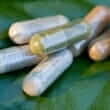Background
- Suma is a large, shrubby, ground vine with an extensive root system. It is indigenous to the Amazon basin and other tropical parts of South America. Suma has also been called "the Russian secret," as it has been taken by Russian Olympic athletes for many years to increase muscle-building and endurance without the side effects associated with anabolic androgenic steroids, such as cardiovascular interactions, increases in low-density lipoprotein (LDL), and liver disease.
- Suma has been used historically as a folk remedy for various indications, such as menstrual disorders. It has also been used as a sexual enhancement and as a general tonic. Based on early research, suma may have potential as an anticancer agent. In limited animal study, suma has been shown to have hormonal effects and to increase sexual performance.
- High-quality human trials supporting the effectiveness of suma for any indication are currently lacking.
References
- Arletti R, Benelli A, Cavazzuti E, et al. Stimulating property of Turnera diffusa and Pfaffia paniculata extracts on the sexual-behavior of male rats. Psychopharmacology (Berl). 1999 Mar;143(1):15-9.
View Abstract - da Silva TC, Paula da Silva A, Akisue G, et al. Inhibitory effects of Pfaffia paniculata (Brazilian ginseng) on preneoplastic and neoplastic lesions in a mouse hepatocarcinogenesis model. Cancer Lett. 2005 Aug 26;226(2):107-13.
View Abstract - Kim KM, Kwon HS, Jeon SG, et al. Korean ginseng-induced occupational asthma and determination of IgE binding components. J Korean Med Sci. 2008 Apr;23(2):232-5.
View Abstract - Nagamine MK, da Silva TC, Matsuzaki P, et al. Cytotoxic effects of butanolic extract from Pfaffia paniculata (Brazilian ginseng) on cultured human breast cancer cell line MCF-7. Exp Toxicol Pathol. 2009 Jan;61(1):75-82..
View Abstract - Oshima M, Gu Y. Pfaffia paniculata-induced changes in plasma estradiol-17beta, progesterone and testosterone levels in mice. J Reprod Dev. 2003 Apr;49(2):175-80.
View Abstract - Subiza J, Subiza JL, Escribano PM, et al. Occupational asthma caused by Brazil ginseng dust. J Allergy Clin Immunol. 1991 Nov;88(5):731-6.
View Abstract - Watanabe T, Watanabe M, Watanabe Y, et al. Effects of oral administration of Pfaffia paniculata (Brazilian ginseng) on incidence of spontaneous leukemia in AKR/J mice. Cancer Detect Prev. 2000;24(2):173-8.
View Abstract







